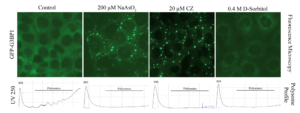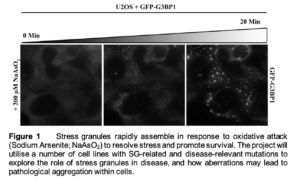Project description
 Eukaryotic cells must compartmentalise to exhibit spatiotemporal control over cellular processes. A classic example is the nucleus, a membrane-bound organelle that physically separates transcription and translation, facilitating the development of intricate post-transcriptional mechanisms not typically observed in prokaryotes. Over the past decade, membrane-less organelles have attracted significant research interest across a wide range of fields and challenged the classical understanding that intracellular organelles require a membrane to participate in regulated and controlled exchange with the cytoplasm. In the contemporary model of the cell, supramolecular structures of protein and RNA are able to rapidly condense, through a process known as phase-separation, in a transient, reversible, and context-dependant manner to form subcellular organelles that lack a delimiting membrane. These organelles have been shown to modulate a wide range of cellular processes by sequestering and concentrating cellular materials and have been implicated in the pathogenesis of a number of age-related conditions including cancer and neurodegenerative disease. The Grellscheid laboratory studies the role of stress granules (membrane-less organelles assembled in response to stress such as oxidative attack) and the RNA-binding proteins and RNA transcripts required to construct them. We employ a range of both wet-lab and computational approaches to examine the physical and biological properties of stress granules, and how this may contribute to the biophysical aetiology of disease.
Eukaryotic cells must compartmentalise to exhibit spatiotemporal control over cellular processes. A classic example is the nucleus, a membrane-bound organelle that physically separates transcription and translation, facilitating the development of intricate post-transcriptional mechanisms not typically observed in prokaryotes. Over the past decade, membrane-less organelles have attracted significant research interest across a wide range of fields and challenged the classical understanding that intracellular organelles require a membrane to participate in regulated and controlled exchange with the cytoplasm. In the contemporary model of the cell, supramolecular structures of protein and RNA are able to rapidly condense, through a process known as phase-separation, in a transient, reversible, and context-dependant manner to form subcellular organelles that lack a delimiting membrane. These organelles have been shown to modulate a wide range of cellular processes by sequestering and concentrating cellular materials and have been implicated in the pathogenesis of a number of age-related conditions including cancer and neurodegenerative disease. The Grellscheid laboratory studies the role of stress granules (membrane-less organelles assembled in response to stress such as oxidative attack) and the RNA-binding proteins and RNA transcripts required to construct them. We employ a range of both wet-lab and computational approaches to examine the physical and biological properties of stress granules, and how this may contribute to the biophysical aetiology of disease.
The exact role of stress granules, how they interact with other cellular components/structures, and the principles underpinning their formation remains unclear. The research group aims to expand the understanding of how stress granules interact with other potential partners in senescence (as a model of ageing) and the biological significance of this interaction.
Tasks
 Any project may employ a wide range of wet-lab techniques including, western blotting, qPCR, immunofluorescence, live-imaging, mammalian cell culture, molecular cloning, and genomic editing (CRISPR).
Any project may employ a wide range of wet-lab techniques including, western blotting, qPCR, immunofluorescence, live-imaging, mammalian cell culture, molecular cloning, and genomic editing (CRISPR).
The project involves: labwork / fieldwork
Starting date/period: 06 Jan 2021 – 30 Dec 2021.
Experience
The student will have the opportunity to gain experience in a wide range of molecular biology techniques.
Involvement
Flexible, Max 40 hours
Interested by this project? Need more info? Contact Thomas Stevenson (Thomas.stevenson@uib.no)
Project number: 032
